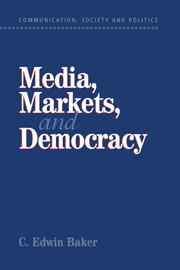9 - Constitutional Implications
Published online by Cambridge University Press: 10 December 2009
Summary
Different theories of democracy not only recommend different normative visions of the press; they also may lead to different interpretations of the Press Clause. In this context, possibly the most important implications of complex democracy, my preferred democratic theory, may appear modest. Yet even here the theory is not unimportant. Rather, its conclusions are anticlimactic in the way that interpreting due process as not justifying Lochner-style interventions was dramatically and importantly anticlimactic. For the complex democrat, the Press Clause mandates very little. Here, I wish to explore those implications and consider why they are so limited.
Any actual constitutional interpretation relies at least implicitly on some interpretive theory. In my view, legally authoritative constitutional interpretation should be, and often is, “motivated conversation” – a conversation within an interpretative tradition in which the point is to understand the text(s) as part of an attempt to provide for a legitimate and workable legal order. It is particularly important that the interpretation aims to be “authoritative” – leading potentially to the application of force. This factor motivates the interpretive point, providing for a legitimate legal order, which in turn operates to constrain interpretative freedom. This motivation distinguishes it, for example, from literary, historical, psychological, economic, or political interpretations. In these alternative frames, motivations for and, hence, the content of the interpretation are much more variable and open.
Past court decisions, historical institutional practice, and the original textual language constitute key conversational “participants.”
- Type
- Chapter
- Information
- Media, Markets, and Democracy , pp. 193 - 214Publisher: Cambridge University PressPrint publication year: 2001



